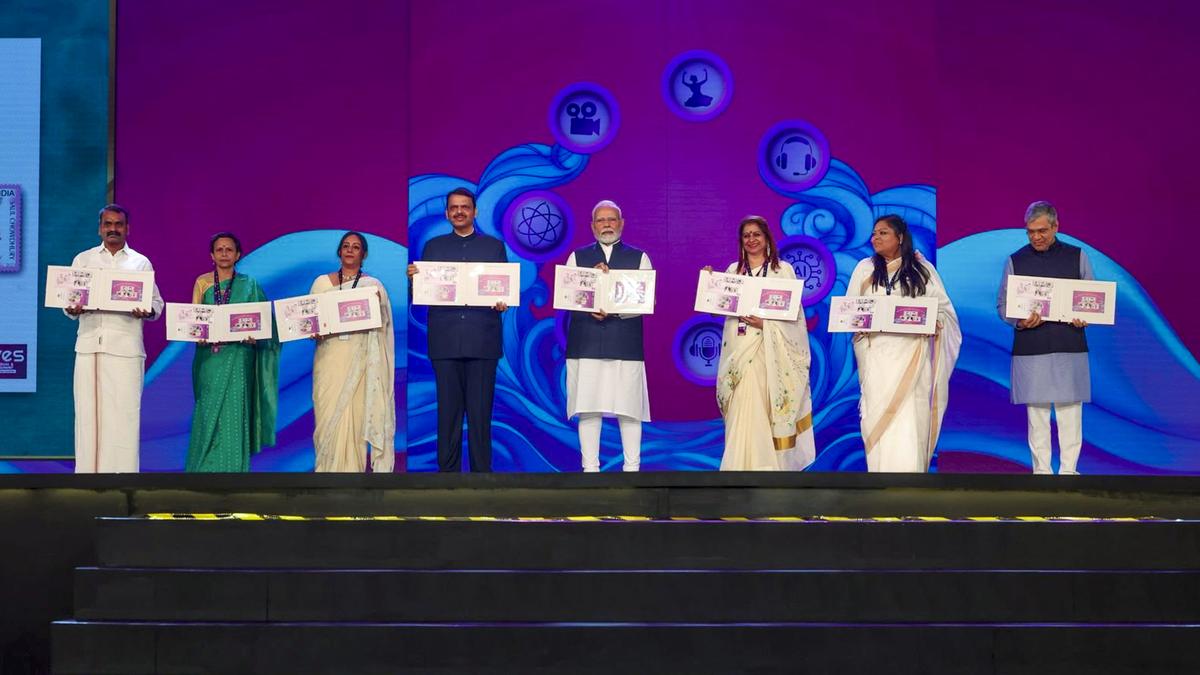
In this image posted by @narendramodi via X on May 1, 2025, Prime Minister Narendra Modi, Maharashtra Chief Minister Devendra Fadnavis, Union Minister of Information and Broadcasting Ashwini Vaishnaw, Union Minister of State L Murugan and others during the World Audio Visual and Entertainment Summit (WAVES) 2025, in Mumbai.
| Photo Credit: X@NarendraModi
Member nations participating in the Global Media Dialogue (2025) on Friday (May 2, 2025) formally adopted the WAVES Declaration, affirming their commitment to promoting cultural diversity, responsible use of emerging technologies such as Artificial Intelligence, and enhanced global cooperation in the media and entertainment sector.
The Declaration, adopted during the ongoing World Audio Visual and Entertainment Summit (WAVES), recognised the sector’s vital role in fostering global harmony and pledged to bridge the digital divide through inclusive and ethical media practices. The document emphasised reducing bias, democratising content creation, and preserving cultural heritage while promoting fair and innovative markets.

A key outcome of the Dialogue was consensus on facilitating global collaboration to strengthen creativity, innovation, and cross-cultural understanding. The Declaration underscored the responsibility of governments in fostering peace and dialogue in a rapidly globalising media landscape.
“We pledge to foster more people-to-people, culture-to-culture, and country-to-country exchanges by championing media and entertainment as a medium for dialogue,” the Declaration stated. It also called for promoting diverse voices, building institutional capacity, and advancing inclusion in media ecosystems.
Concerns over the proliferation of misinformation and disinformation were raised by several member states, who advocated for greater emphasis on “responsible journalism”. The Declaration responded by calling for collaborative 0measures to promote media integrity, fact-based reporting, and ethical advertising.
Supporting content that respects human rights and cultural sensitivities, the Declaration also encouraged creators and audiences – whose roles are increasingly interchangeable due to digital platforms – to consider the social and ethical impact of their actions.
It reaffirmed support for intellectual property protection while encouraging open markets and innovation. “Meeting at a time of heightened uncertainty and in the aftermath of a devastating pandemic, we affirm the exceptional power of media and entertainment to unite people and deepen resilience in interconnected markets,” the Declaration noted.
Member countries also reiterated their commitment to the Sustainable Development Goals, with a focus on inclusive growth, institutional strengthening, and enduring partnerships to promote peace and prosperity. The Declaration supported enhancing choice, access, and affordability in media consumption to address the digital divide, along with creating jobs and sustaining open, inclusive spaces for creativity and cultural expression.
Addressing the Dialogue, External Affairs Minister S. Jaishankar described WAVES 2025 as a “microcosm of the global community,” bringing together creators, policymakers, producers, and visual artists to chart a roadmap for the sector’s future. He noted that the evolving world order had a strong cultural component. “It is essential that we give voice to our traditions, heritage, ideas, practices, and creativity,” he said.
Emphasising the synergy between technology and tradition, Mr. Jaishankar said technology could amplify awareness of heritage, particularly among the youth. “It is crucial that young talent is made ready for an age of creative collaboration through targeted skill development. Innovation is the key to the leapfrogging required to realise Viksit Bharat,” he added.
Information and Broadcasting Minister Ashwini Vaishnaw, in his opening remarks, observed that culture was the foundation of creativity and played a unifying role across borders. “We are at an inflection point where local content creation must be incentivised,” he said.
Welcoming delegates from 77 countries, Mr. Vaishnaw emphasised the importance of co-production treaties, joint funding mechanisms, and regulatory frameworks that promote collaboration, digital inclusion, and global harmony.
India also shared progress on its ‘Create in India’ initiative, informing participating nations that 32 creative challenges held during the first season of WAVES had identified over 700 top creators worldwide. From the next edition, these challenges will be conducted in 25 global languages.
Published – May 02, 2025 09:40 pm IST
Anurag Dhole is a seasoned journalist and content writer with a passion for delivering timely, accurate, and engaging stories. With over 8 years of experience in digital media, she covers a wide range of topics—from breaking news and politics to business insights and cultural trends. Jane's writing style blends clarity with depth, aiming to inform and inspire readers in a fast-paced media landscape. When she’s not chasing stories, she’s likely reading investigative features or exploring local cafés for her next writing spot.




